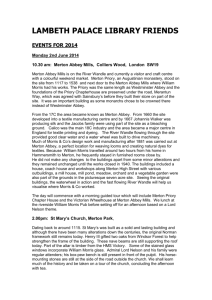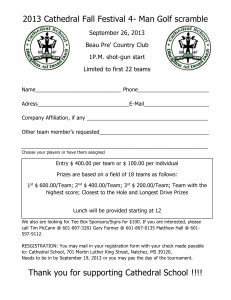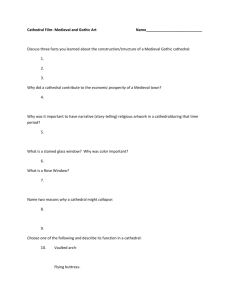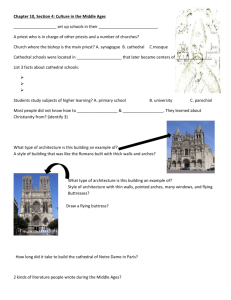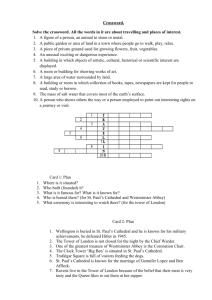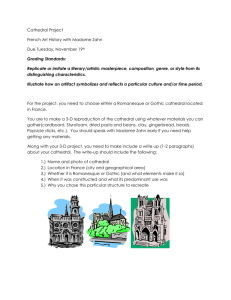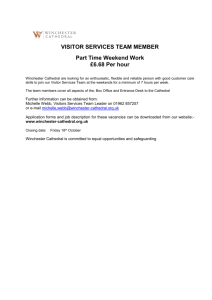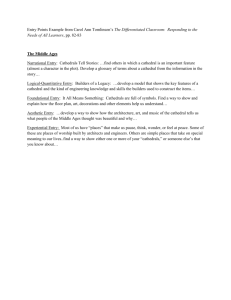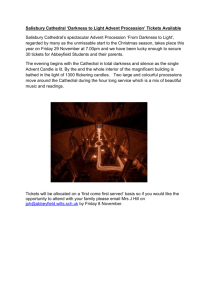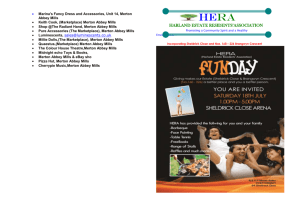LAMBETH PALACE LIBRARY FRIENDS
advertisement
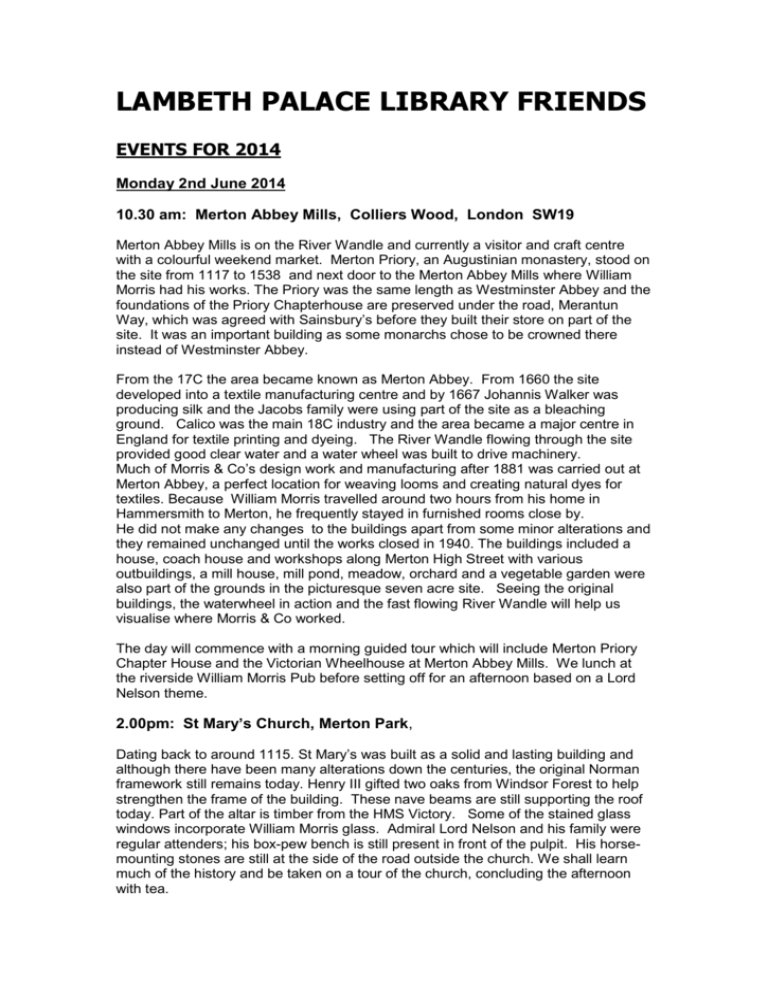
LAMBETH PALACE LIBRARY FRIENDS EVENTS FOR 2014 Monday 2nd June 2014 10.30 am: Merton Abbey Mills, Colliers Wood, London SW19 Merton Abbey Mills is on the River Wandle and currently a visitor and craft centre with a colourful weekend market. Merton Priory, an Augustinian monastery, stood on the site from 1117 to 1538 and next door to the Merton Abbey Mills where William Morris had his works. The Priory was the same length as Westminster Abbey and the foundations of the Priory Chapterhouse are preserved under the road, Merantun Way, which was agreed with Sainsbury’s before they built their store on part of the site. It was an important building as some monarchs chose to be crowned there instead of Westminster Abbey. From the 17C the area became known as Merton Abbey. From 1660 the site developed into a textile manufacturing centre and by 1667 Johannis Walker was producing silk and the Jacobs family were using part of the site as a bleaching ground. Calico was the main 18C industry and the area became a major centre in England for textile printing and dyeing. The River Wandle flowing through the site provided good clear water and a water wheel was built to drive machinery. Much of Morris & Co’s design work and manufacturing after 1881 was carried out at Merton Abbey, a perfect location for weaving looms and creating natural dyes for textiles. Because William Morris travelled around two hours from his home in Hammersmith to Merton, he frequently stayed in furnished rooms close by. He did not make any changes to the buildings apart from some minor alterations and they remained unchanged until the works closed in 1940. The buildings included a house, coach house and workshops along Merton High Street with various outbuildings, a mill house, mill pond, meadow, orchard and a vegetable garden were also part of the grounds in the picturesque seven acre site. Seeing the original buildings, the waterwheel in action and the fast flowing River Wandle will help us visualise where Morris & Co worked. The day will commence with a morning guided tour which will include Merton Priory Chapter House and the Victorian Wheelhouse at Merton Abbey Mills. We lunch at the riverside William Morris Pub before setting off for an afternoon based on a Lord Nelson theme. 2.00pm: St Mary’s Church, Merton Park, Dating back to around 1115. St Mary’s was built as a solid and lasting building and although there have been many alterations down the centuries, the original Norman framework still remains today. Henry III gifted two oaks from Windsor Forest to help strengthen the frame of the building. These nave beams are still supporting the roof today. Part of the altar is timber from the HMS Victory. Some of the stained glass windows incorporate William Morris glass. Admiral Lord Nelson and his family were regular attenders; his box-pew bench is still present in front of the pulpit. His horsemounting stones are still at the side of the road outside the church. We shall learn much of the history and be taken on a tour of the church, concluding the afternoon with tea. Cost: £45.00 which includes morning coffee, lunch and tea. Please send cheque made out to The Friends of Lambeth Palace Library and a SAE and send to: Mrs Gloria Stein, 6 Densham Drive, Purley Surrey CR8 2XG. 0208 645 0375. Email: oscarstein@msn.com Monday 1st September 2014 Marble Hill House and Strawberry Hill, Twickenham. Middx. 11.00am: Marble Hill House for coffee and biscuits followed by a tour of the house. This is a beautiful Palladian villa set in 66 acres of riverside parkland. Originally built for Henrietta Howard, mistress of George II when he was Prince of Wales, the fashionable Georgian villa became an Arcadian retreat from the crowded 18C London. Its grand interiors have been stunningly restored and include a fine collection of early Georgian paintings. After morning coffee we shall be taken on a tour of the house before leaving for lunch at: Strawberry Hill House After lunch we shall be taken on a guided tour concluding with afternoon tea. Horace Walpole bought Strawberry Hill in 1749 and over the next half century converted it into his own vision of a ‘Gothic’ fantasy. A century later, Lady Frances Waldegrave added a magnificent wing to Walpole’s original structure. The building has recently been restored to its dramatic original glory, recreating Walpole’s original intention for his own home. Cost : £56.00 (including morning coffee, lunch & tea). Please send cheque made out to: The Friends of Lambeth Palace Library and a SAE and send to Steve Ward, 35, The Green, Burmarsh, Kent. TN29 0JL. Tel: 07591 924443 email: wearlord@aol.com These events are not now likely to take place until 2015 Gloria Stein retired as Events Secretary in the summer of 2014 and her successor Steve Ward unexpectedly had to resign the position for family health reasons this autumn. The Friends are hoping to find a volunteer to take their place as soon as possible. For a date to be confirmed Arundells and Salisbury Cathedral Arundells was a canonry in the thirteenth century and probably first used by Henry of Blunston, Archdeacon of Dorset, who died in 1316. From the mid-1550s the house was leased by the Dean and Chapter of the Cathedral to lay tenants, notably Richard Mompesson and John Wyndham. Much of the current house's appearance is due to John Wyndham who lived here between 1718 and 1750. In the 1800s it housed the Godolphin Girls School and a boys’ boarding school (not at the same time!). After a period of decay and neglect in the 1960s, when demolition was considered by the Chapter, Arundells was faithfully renovated in 1964 by Mr and Mrs Robert Hawkings, with further refurbishment by Edward Heath when he came to live there in 1985. Sir Edward was able to purchase the freehold of the property in 1992 which is now owned and run by the charity set up in his name, the Sir Edward Heath Charitable Foundation. Over many years and six distinct periods of architecture, Arundells has developed into one of the finest houses inside the Cathedral Close. Sir Edward Heath’s collections of musical and sailing memorabilia, oriental and European ceramics, paintings (including William Wyllie, John Singer Sargent, John Piper, Winston Churchill, Walter Sickert, Augustus and Gwen John, John Nash, L S Lowry and many more), original political cartoons, Chinese and Japanese artworks, bronzes and photographs are all on display within. The house is surrounded by a beautiful two-acre medieval walled garden, stretching down to the confluence of the rivers Avon and Nadder with perfect views of Salisbury Cathedral. Salisbury Cathedral This vibrant Cathedral with Britain's tallest spire and best preserved Magna Carta is just 8 miles from Stonehenge. Formally known as the Cathedral Church of the Blessed Virgin Mary, it is one of the leading examples of Early English architecture. It is a truly remarkable building, a testimony to the faith and practical skills of the medieval craftsmen who built it. As the Cathedral Church of the Salisbury diocese it is Mother Church of several hundred parishes in Wiltshire and Dorset. It is also a centre of pilgrimage for hundreds of thousands of visitors every year. For a date to be confirmed St Paul's Cathedral with Traditional Afternoon Tea St Paul's Cathedral was built around 1680 after the great fire of London, but a church to St Paul has stood here since 604AD. Designed by Sir Christopher Wren, the current St Paul's remains an imposing landmark on the London skyline. Many royal weddings, birthday thanksgivings and funerals have taken place here, including the marriage of Charles and Diana. One of the highlights of a visit to St Paul's is the Whispering Gallery in the dome where, due to its multilayer construction, you can whisper to the wall and be heard on the opposite side of the gallery. For spectacular views across London, you can climb to the top of the dome. As well as the historic art and design of the cathedral interior, St Paul's has a vibrant contemporary arts project which commissions artists to make new works for the cathedral. It also has a musical program including organ recitals. The crypt is the burial place for many notable people, including Sir Christopher Wren himself.
